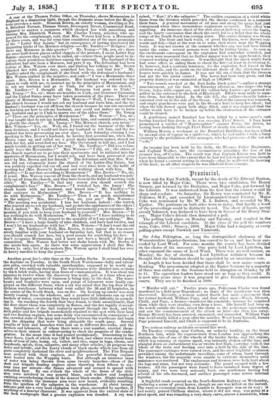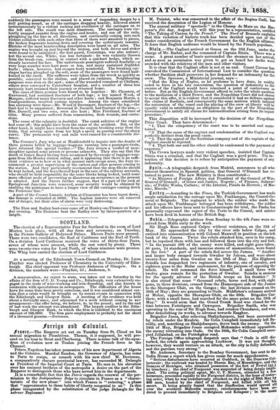roututial.
The seat for East Norfolk, vacant by the death of Sir Edward Buxton, is now filled by Major Coke. There were two candidates, Sir Henry Stracey, put forward by the Derbyites, and Major Coke, put forward by the Liberals. It was understood from the first that the contest would be sharp and resolute. On Saturday, Sir Henry was nominated by Mr. E. Fellowes, M.P., and seconded by Lieutenant-Colonel Fitzroy. Major Coke was nominated by Mr. W. E. L. Bulwer, and seconded by Mr. Upcher. The partisans on both sides were so noisy, that hardly a word of the proceedings could be distinctly heard. The show of hands, pretty evenly balanced, was declared to have been in favour of Sir Henry Stra- cey. Major Coke's friends then demanded a poll. The polling took place on Monday and Tuesday, and resulted in the triumph of the Liberal candidate. At the close of the poll the numbers were, Coke, 2933 ; Stracey, 2698. Major Coke had a majority at every polling-place except Norwich and Yarmouth.
Sir John Pakington, so long the distinguished chairman of the Worcestershire Quarter-Sessions, has ceased to be so, and has been suc- ceeded by Lord Ward. For some months the county has been divided on the choice of his successor. One party held by Lord Lyttelton, the other espoused the cause of Lord Ward. There was no real contest, on Monday, the day of election. Lord Lyttelton withdrew because he thought that the chairman should be appointed by an unanimous vote.
At length it has been decided that there shall be new assize courts at Reading. The presentment adopted at the Easter Sessions by a majority of three was carried at the Sessions held in Abingdon on Monday by 29 to 11. The opposition leaders have stood out as long as they could. It is now nine years since it was proposed to give Reading decent assize courts. They are to be finished in 1860.
" Murder will out." Twelve years ago, Policeman Clarke was found murdered in a field near Dagenham ; no trace of the murderers was then discovered. Recently, a woman named Smith has made a statement that her former husband, William Page, and four other men—Wood, Blewett, Chalk, and Page, a farmer—murdered the constable, because he surprised them while they were stealing corn from a barn. She herself had been on the watch outside the barn, raised the alarm as the policeman approached, and saw the commencement of the attack on him—she then ran away. George Blewett has been arrested, examined, and remanded. William Page was accidentally killed a year after the murder, Wood hung himself, farmer Page poisoned himself, and Chalk is supposed to be in Australia.
Two serious railway accidents occurred this week.
On Tuesday evening, near Carlton, an unlucky localitv, on the Great Northern line, while the express-train from London was -approaching the station, the tire of one of the wheels of the tender broke, and the engine, which was running at express speed, was instantly shaken off the line, and plunged down an embankment ten or twelve feet high, carrying with it the whole of the train and heeling over into a field by the side of the line. The passenger-carriages were turned over, and the most frightful confusion prevailed among the unfortunate travellers, some of whom burst through the windows, but the majority were unable to extricate themselves until assistance was rendered. The engiueman and fireman were both hurt about the legs and arms, but not very seriously. The guard escaped with a few bruises. All the passengers were found to have sustained some degree of injury, and two were very seriously hurt, one gentleman having had several of his ribs fractured, and another passenger some severe internal injuries.
A frightful crash occurred on the South-Eastern Railway on Wednesday, producing a scene of great horror, though no one was killed on the instant." The express excursion-train from London to Ramsgate was on its way ; it had nearly gained Chilbam station, where it did not stop, was going at great speed, and was rounding a very sharp curve, almost a semicircle, when
suddenly the passengers were roused to a sense of impending danger by a dull grating sound, as of the carriages dragging heavily, followed almost instantaneously by a violent rocking and overthrow of the carriages on to the left side. The result was most disastrous. The carriages were vio- lently snapped asunder from the engine and tender, and ran off the rails, ploughing up the line in all directions, and continually coming into such violent collision with each other that three of them were smashed to pieces, the broken fragments bearing down and covering the unfortunate inmates. Shrieks of the most heartrending description were heard on all sides. The engine was brought up just beyond the station, and both driver and stoker were found to be uninjured ; the first guard, Cummings, was also unhurt ; but the second one White, was less fortunate : he was violently thrown from the break-van, coming in contact with a quickset hedge, which se- riously lacerated his face. The unfortunate passengers suffered fearfully—a very large number were hurt more or less, and many sustained frightful hurts ; others, however, had escapes truly wonderful. The breaking car- riages having ploughed up the soil, some of the passengers were found half- buried in the earth. The sufferers were taken from the wreck as quickly as possible, conveyed to the station, and placed on cushions. Neighbouring surgeons were soon on the spot ; some of the wounded remained at Chilham, others were conveyed to Canterbury hospital, and a number of those less seriously hurt resumed their journey or returned home.
The cases of three persons were feared to be hopeless : Mr. Channon, of Gravesend, had sustained fractures of both legs; a boy named Wood, of Margate, suffered many fractures and other hurts ; and Benjamin Harris, a Coastgnardman, received various injuries. Among the cases considered less alarming were these—Mr. Wood of Davenport, fracture of the leg,—the limb had to be amputated ; Reverend D. Darnell, bad fracture of the arm — Mrs. Darnell, and two sons, were also hurt ; Miss Friedland, fracture of tibia. Many persons suffered from concussions, flesh wounds, and contu- sions.
The cause of the calamity is doubtful. The crank axletree of the engine had come off; this might have been the cause of the accident. But, on the other hand, it might have resulted from the engine breaking away from the train, that arising again from too high a speed in passing over the sharp curve. The permanent way and rails were ruined for a considerable dis- tance.
The Coroner's Jury who sat at Huddersfield to inquire into the deaths of three persons killed by luggage-waggons running into a passenger-train, have returned this special verdict—" The Jury return a verdict of man- slaughter against sonic person or persons unknown. They also say that the death. of Jasper Beard having been occasioned by the escape of luggage-wag- gons from the Henley station siding, and it appearing that there is no suffi- cient evidence as to how or in what manner such escape arose, the Jury re- commend a greater supervision of the carters and other persons coming to the station. And they particularly recommend that the stop-blocks should be kept locked, and the keys thereof kept in the care of the railway servants, who should be held responsible for the same blocks being locked, until some more efficient mode of preventing so disastrous an occurrence as the present is adopted. And the Jurors further suggest, that if a part of the rock at Springwood Junction were removed, some security would be obtained by enabling the pointsman to have a longer view of the carriages coming down the Peniatone line."
A part of the County Lunatic Asylum at Gloucester has been burnt down; the damage is estimated at 50001. The hapless inmates were all removed out of danger, but their cries of alarm were very distressing.
The Eton and Radley boat-race came off at Henley-on-Thames on Satur- day evening. The Etonians beat the Radley crew by three-quarters of a length.



































 Previous page
Previous page